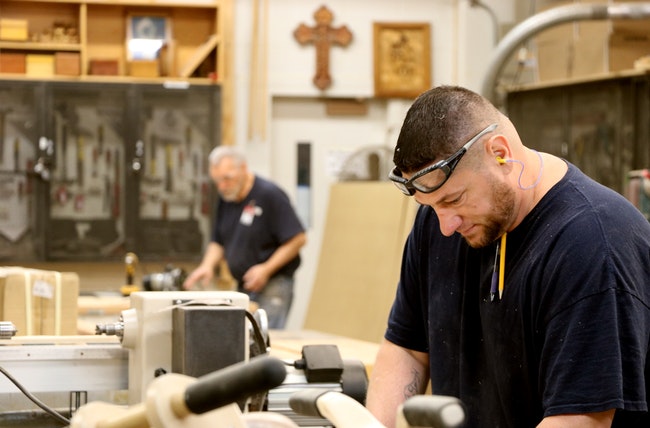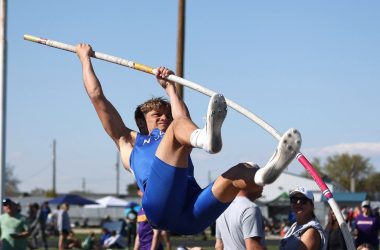 James Howard, an inmate at Snake River Correctional Institution, works in the woodworking room in the prison’s physical plant facility. (The Enterprise/Joe Siess)
James Howard, an inmate at Snake River Correctional Institution, works in the woodworking room in the prison’s physical plant facility. (The Enterprise/Joe Siess)
ONTARIO – The humming grind of lathes on wood and the crackling of welders on steel are the unmistakable sounds of the workshop.
They are also the din that fills Snake River Correctional Institution’s physical plant, or workshop.
At Snake River, inmates have a chance to vie for jobs in the prison’s physical plant to develop valued skills for the workforce after they are freed.
Snake River, the largest prison in Oregon, sits on 103 fenced acres and houses more than 3,000 inmates.
Work training and skill development are part of the rehabilitation efforts at the prison. Inmates might train to become a licensed journeyman electrician, earn a welding certificate from the nationally recognized American Welding Society, or become a card-carrying cabinet-making journeyman, among other trades.
Getting the prison-based jobs is highly competitive, requiring an application and interview, just as on the outside.
According to Amber Campbell, public information officer at Snake River, 54 inmates have become licensed electricians since 2008 after their apprenticeship in prisons across the state. Since 2014, 71 inmates in the state have completed either welding or custodial certification programs. Numbers for Snake River weren’t available.
[ KEEP YOUR LOCAL NEWS STRONG – SUBSCRIBE ]
When inmates receive their electrical licenses, Platt Electric Supply gives each a set of electrical tools, Campbell said.
Jerry Stelling, the physical plant manager at Snake River, said that about a year ago, the prison changed operations at the physical plant so inmates went through an application process.
“They have to sit there and interview with a supervisor of the shop for a job,” Stelling said. “They get nervous. Sometimes we stop the interview and say, ‘Calm down, you’re OK.’”
The rationale behind the process is that inmates, in addition to gaining the hands-on skills, also learn how to get the job, Stelling said.
The physical plant is located in a part of the prison called Complex 1, and to work at the plant, an inmate must conduct himself in a certain way.
“If they can’t live in Complex 1, they can’t work in the physical plant,” Campbell said. “It’s a great incentive. It gives them goals – something to shoot for.”
John Ovendale, who is from California, ran night clubs in Las Vegas before being convicted of sex crimes and beginning his sentence at Snake River in October of 2010. He currently works in the parts room doing inventory.
“Being in prison, when you get out, you are already going to have strikes against you on trying to find work, so anything you can do to help you succeed when you get out, that’s kind of the reason for it,” Ovendale said.
Ovendale has nearly completed the heating, ventilating and air conditioning certification program and is currently working on his electrician certification. He hopes to find a job using those skills when he is released.
Ovendale said working at the physical plant provides knowledge of what work experience is like on the outside. It also affords the working inmates more leeway.
“Being incarcerated, where can you go up on the roof and start working on the ventilation systems for the institution or wiring up lights and doing electrical back up power? You don’t get that experience just being here,” he said.
Ovendale said he joined the program to keep his mind off the daily grind of prison life, but he soon developed a passion for his work.
“There is only so far you can go with being incarcerated. For me to have an expectation that when I get out I’ll be 100% prepared, I don’t think anybody can be 100% prepared. They can do the best they can while in here,” he said.
The prospect of getting out worries Ovendale. He knows finding a job could be difficult because of his criminal record.
“As long as I put forth everything that I can do to make sure that I have all of my ducks in a row for when I get out to get a job, that’s the best I can do, and that’s one of my main goals. If I am doing the best I can, in here, to obtain work when I get out, I’ll be successful,” he said.
Ovendale has worked in the physical plant for about two years. By August 2021 he’ll be eligible to take his license exam, proctored by Treasure Valley Community College. If he passes, he will be a licensed limited maintenance electrician.
He is scheduled to be released in 2025.
Ovendale said being in the physical plant is an incentive, and that the inmates who are fortunate enough to have a position, value the work that they do.
“I think it would be beneficial for anybody new coming into the institution,” Ovendale said.
Josh Naval, an inmate serving time for sex crimes, has been in the welding program for about 10 months.
“There are multiple stages of the program for different styles of welding and as you complete you move into the next one of your choosing,” Naval said.
Naval said he has made major gains since he started the program.
“The ability to have hands on, it’s a good incentive knowing that when I get out I can walk in some place and say, ‘I may have this criminal record behind me, but while I was there I did something with my time there and I’ve got these certifications to show. Look, don’t use my history against me. I can be a productive person in society.’”
Naval has been at Snake River for 10 years, with a little over four years to go.
In the plant’s parts room, Scott Graue, an inmate serving time for sex crimes, was hard at work.
The parts room contains everything needed to make repairs in the prison.
“This is the Ace Hardware of Snake River,” Graue said. “Literally, that’s what it is.”
He said he’s motivated to work in the parts room because it provides the opportunity to hone his organizational skills.
“But also it makes the day go by. I mean the days just fly when you come up here, and there’s not a lot of drama up here, and it’s nice and quiet,” Graue said. “It’s kind of like you’re not in prison here. It really is. You just forget about it.”
Graue recalled his interview for the job.
“It’s a pretty strenuous interview, and before you even get hired, you have to go through security. Security has to do a background check on you and make sure you are not a problem child and you follow the rules… There’s quite a stringent process,” Graue said.
Graue worked as a computer electronic engineer before being sentenced to Snake River, and has been in prison for 12 years.
Inmates who work at the physical plant encourage newer inmates to seek work at the plant.
Graue said he tells them, “Hey, this is a great place to work, there’s no drama here, you can come up and it’s an all-day program so you are away from the mess that’s out there sometimes. And you are going to learn a trade, something that is going to benefit you on the outside.”
Graue has nearly five years left before his release.
Next to the parts room is the woodworking shop, where inmates are fashioning a variety of wooden items such as Christmas ornaments and furniture.
Trent Keep, a state carpenter who oversees the woodworking room, said the inmates who work with furniture and custom woodworking in the shop can emerge as experts in the craft.
Keep nodded towards an inmate working diligently on a project and said, “Like this guy right here, he picked it up like ‘bam.’”
That inmate, James Howard, has been at Snake River for 16 years, serving a sentence for crimes ranging from burglary and theft to unauthorized use of a vehicle and illegally possessing a firearm.
“The only thing I’ve ever been good at my whole life is drugs and alcohol and stealing and things like that,” Howard said. “It took me quite a few years to slow down and figure out what’s important and what I want out of life, and it’s no longer drugs and alcohol. This is what I’m going to do for the rest of my life.”
Howard is also in the quilting program at Snake River.
“I can sew like nobody’s business,” Howard said. “I can crochet. I’m an excellent woodworker now. I never thought I’d be good at anything.”
Howard said after he arrived at Snake River, he was in and out of segregation – “the hole” – for fighting and other infractions. But getting the chance to work in the clothing shop and then the physical plant gave him a new sense of purpose.
“I was just tired of all the pain and living in and out of the hole and all the things I was doing wrong,” Howard said. “So many success stories walk out of this physical plant. More so than anywhere else.”
Howard plans to move to Alaska to make furniture and cabinetry when he gets out of prison.
Across from Howard, Brad Looney, an inmate serving a sentence for sex crimes who has been working at the physical plant for two years, was busy making wooden Christmas ornaments.
Looney said working in the plant changes people.
“When they start learning and they realize they can do something, it gives them purpose and hope, for sure,” he said.
Donald Skelton, an inmate serving a sentence for crimes such as assault and illegally possessing a firearm, agreed.
“I mean this is different than 20 years ago, because I remember 20 years ago you really couldn’t get anything, and you left with nothing and when you left with nothing, that’s failure,” Skelton said.
News tip? Contact reporter Joe Siess: [email protected] or 541-473-3377.
For the latest news, follow the Enterprise on Facebook and Twitter.
SUBSCRIBE TO HELP PRODUCE VITAL REPORTING — For $5 a month, you get breaking news alerts, emailed newsletters and around-the-clock access to our stories. We depend on subscribers to pay for in-depth, accurate news produced by a professional and highly trained staff. Help us grow and get better with your subscription. Sign up HERE.




